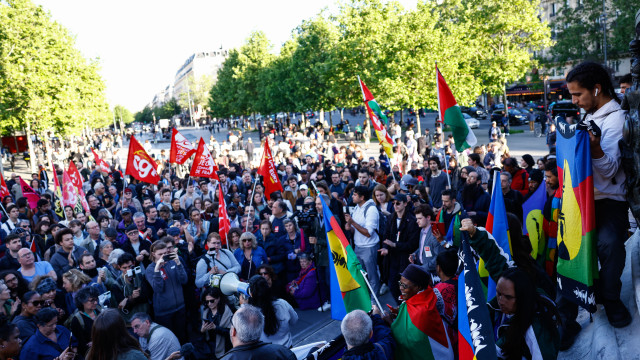Days of unrest on the Pacific archipelago of New Caledonia have left five people dead and hundreds injured, prompting French authorities to declare a state of emergency.
Thousands of people took to the streets for three nights of protests, rioting and looting, French media reported. Five people died, including two police officers.
A state of emergency has been declared and the French military has been deployed to restore order and secure critical infrastructure such as ports and airports.
All commercial flights have been cancelled, leaving tourists stranded and desperate for ways to get home.
Armored vehicles are already plying the streets of the capital. Protesters and frightened residents have set up rival checkpoints and roadblocks.
Police efforts to impose a curfew and ban the sale of alcohol have so far failed to quell the violence.
Since France took control of New Caledonia in the mid-19th century, relations between the indigenous Kanak people and European settlers have soured.
But this is the worst violence the islands have seen since the 1980s.
Apparently, the reason for this is the French government's efforts to change the voting rules in New Caledonia's elections.
Paris lawmakers are backing a constitutional change that gives residents who have lived in the province for more than 10 years the right to vote in provincial elections, which would add 25,000 people to the rolls. The islands' electoral rolls have been frozen since 1998 - something supporters of the change say is undemocratic and disenfranchises some citizens.
"People who come from the so-called First Nation feel they have more legitimacy than others, but those who have arrived because of life events feel that this is their land too and that they should be treated equally," Nicolas Metzdorf, a lawmaker from Macron's party who supports the change, explained to France Inter radio.
The Kanaks fear that expanding the electoral rolls will favor pro-French politicians and dilute their vote.
"For the separatists, electoral lists have been the mother of all battles from the start. They can't help but think that eventually the French Republic wants to sweep them away once again in their own country," said Philippe Gomez, a former head of government in the territory who opposes its independence.
Kanaks make up about 40% of New Caledonia's 270,000 people.
The islands' politics are tied to the ongoing debate over New Caledonia's independence - which has been the subject of three referendums. The last referendum was held in 2021 and was very controversial.
Many Kanaks boycotted the vote, which took place even though New Caledonia, and the world, was in the grip of the Covid-19 pandemic.
The Kanak people want another referendum on the issue.
Denise Fisher, Australia's former consul-general in New Caledonia, commented that years of simmering tensions had finally erupted.
"There has been serious violence over the last three days. To expect that all parties would come to the same table - after what happened - is almost untenable," she said.
With armed police unable to restore order, France has called in the military. Paris said it would set up an "air bridge" from France to move in military and police reinforcements quickly, but also to deliver essential supplies to the population.
The islands are heavily dependent on imports and some supplies are beginning to run low.
Nicole George, a visiting Australian educator, said store shelves are empty and some bakeries are telling locals to save bread for the day ahead.
French President Emmanuel Macron offered to hold talks with New Caledonian lawmakers and called for a resumption of political dialogue.
Macron offered to hold meetings with parties that support independence and those that oppose it before the voting reform officially takes effect, a proposal accepted by the FLNKS - the Front National pour la Libération du Kanak et les Socialistes - a major pro-independence party.
The pro-independence and anti-independence parties issued a joint statement calling for "calm and reason", adding that "we are destined to continue living together".
But Fisher cautioned that "there is still much to overcome to bring us around the negotiating table." She remains hopeful that a solution will be found but warned that it will not be an easy process.
"It's going to take time, it's not going to be soon because the wounds of the last three days are very deep," she stressed.
Leaders of neighboring Pacific nations have come out in support of the people of Kanak.
The secretary-general of the Pacific Islands Forum - a regional bloc - Henry Puna said that while the violence was "unfortunate", it was to be expected.
"This is something we really need to talk about openly and honestly. What are the causes of the problem and what are the solutions," he explained.
Cook Islands Prime Minister Mark Brown added that greater independence is needed for the Kanak people.
"The reason is to recognize greater autonomy and greater independence for the people of these islands," he said.
New Zealand's Foreign Minister Winston Peters called for a peaceful solution to the situation.
"The immediate priority must be for all parties to take steps to de-escalate the situation so that there can be dialogue and calm," he said. / BGNES







